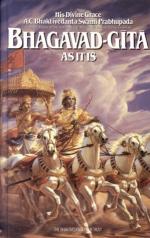
|
| Name: _________________________ | Period: ___________________ |
This test consists of 5 short answer questions, 10 short essay questions, and 1 (of 3) essay topics.
Short Answer Questions
1. According to Krishna where does reality lie?
2. What has the person done, who indulges his senses for his own pleasure, ignoring the needs of others, according to Krishna?
3. According to Arjuna, what happens when a family declines?
4. What do the foolish not look beyond?
5. Who does Krishna say is the purifier?
Short Essay Questions
1. What does Krishna say about competing with another's dharma?
2. Who does Arjuna see lined up to fight? What is his reaction?
3. What does Krishna tell Arjuna about work?
4. What are some of the reasons Krishna says people worship him?
5. What does Krishna say about those who have gone beyond the dualities of life?
6. Why does Arjuna suggest he could receive no satisfaction from killing Dhritarastra's sons?
7. What does Krishna say determines the destination of the dying.
8. What is the first thing Sri Krishna says to Arjuna?
9. Of those who seek the spiritual life, who are the most blessed according to Krishna?
10. What does Krishna say about the duality of attraction and aversion?
Essay Topics
Write an essay for ONE of the following topics:
Essay Topic 1
Seeing Arjuna's despair prior to battle, Sri Krishna rebukes him saying such weakness in a time of crisis is unworthy of him. Krishna urges Arjuna to rise up with a brave heart and destroy the enemy.
Describe Arjuna's response in detail. What is the logic of Arjuna's argument? Upon what sources does Arjuna rely to support this argument? To what conclusion does the argument lead? Discuss while citing specific examples.
Essay Topic 2
The theme of duality arises consistently in the Bhagavad Gita. What is duality and why is it central to Krishna's teaching? Discuss citing specific examples.
Essay Topic 3
What are sense objects? Why are they important to Krishna's teaching? What is the relationship of the ignorant to sense objects? What is the relationship of the wise to the same? Discuss citing specific examples.
|
This section contains 695 words (approx. 3 pages at 300 words per page) |

|




